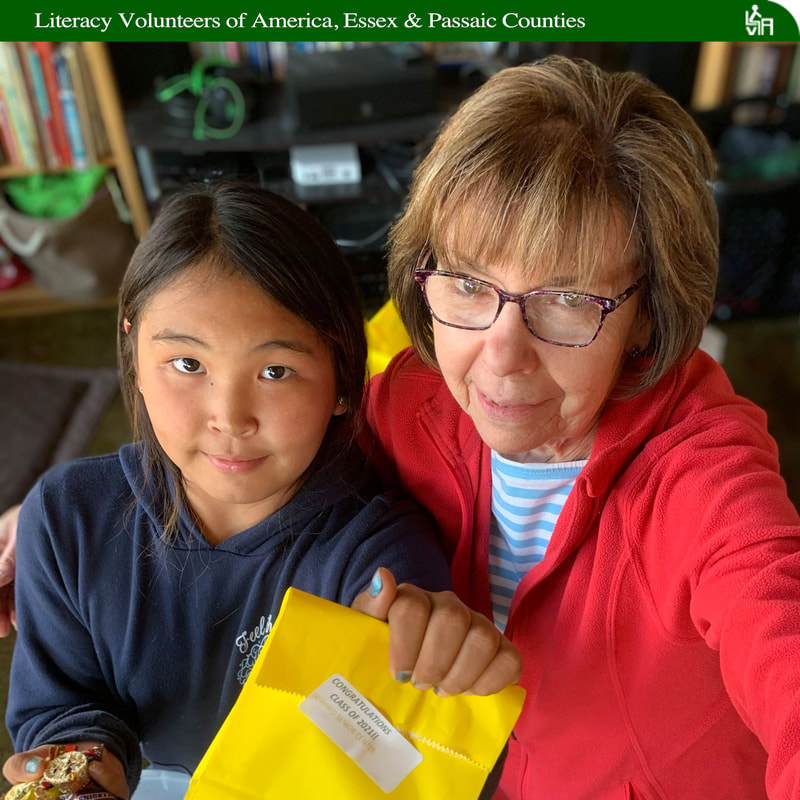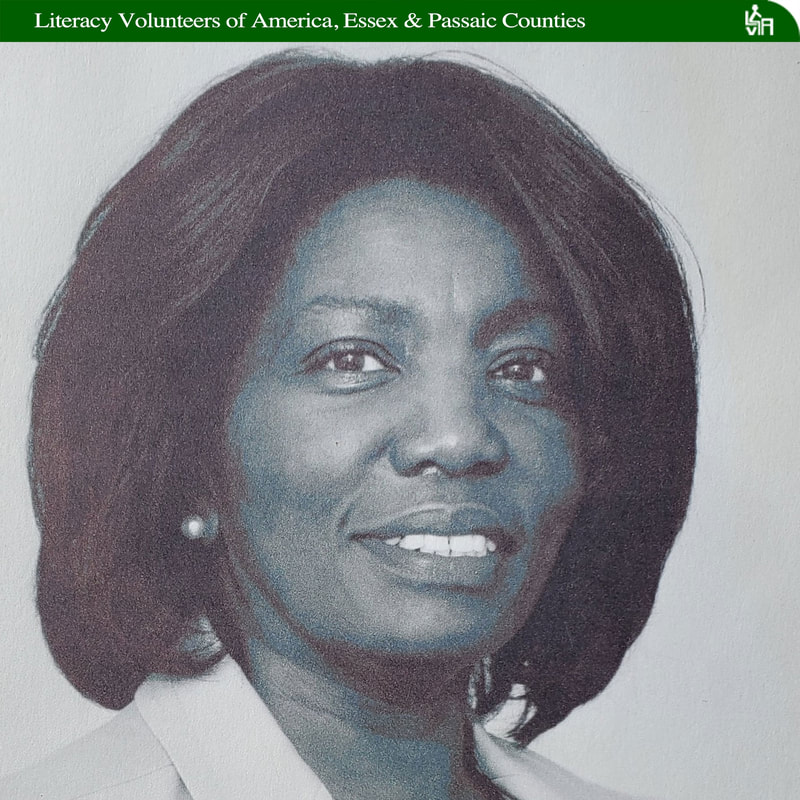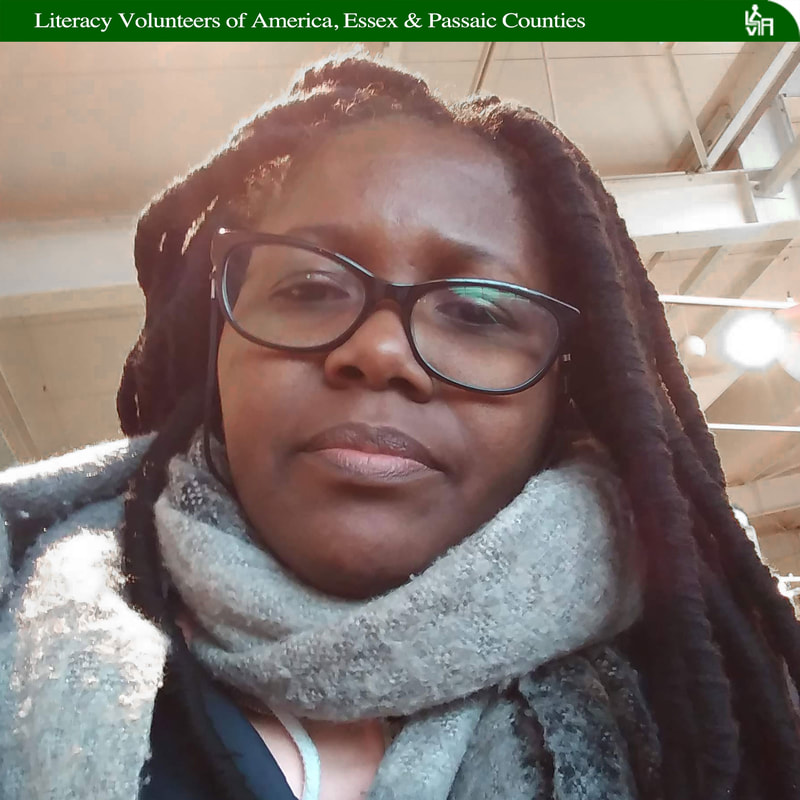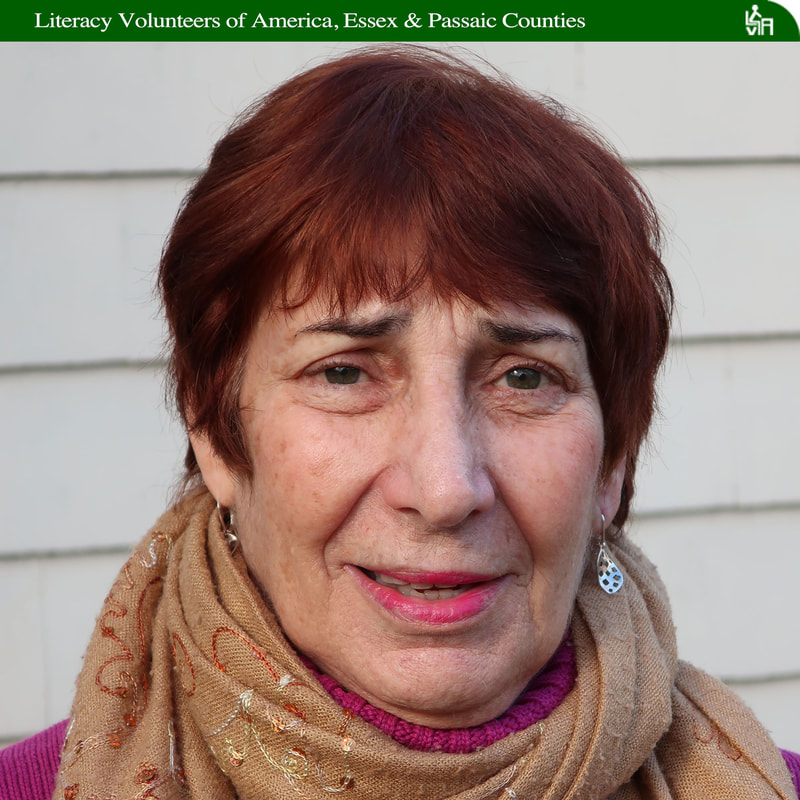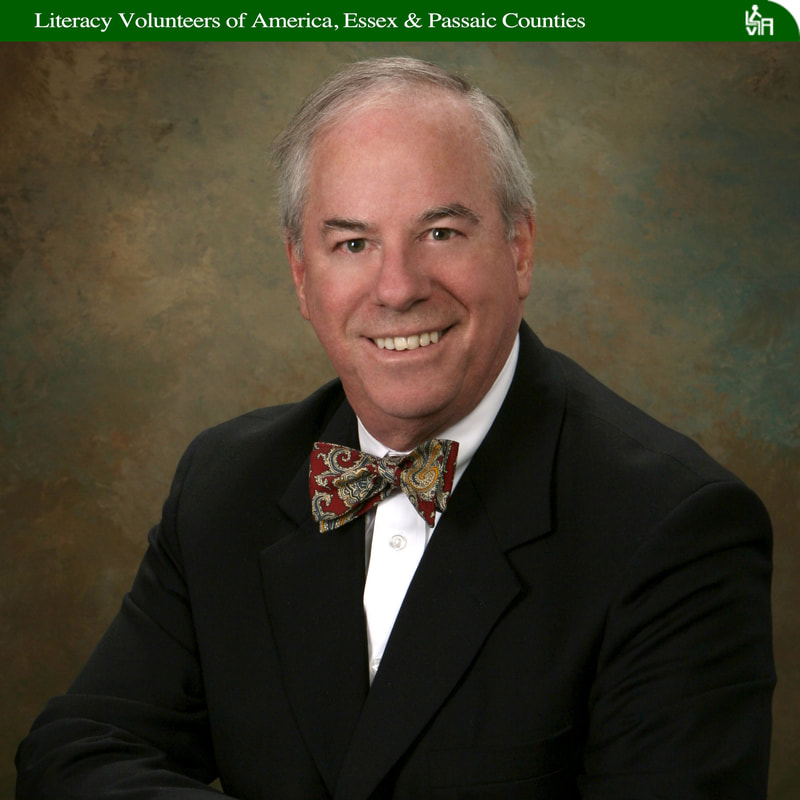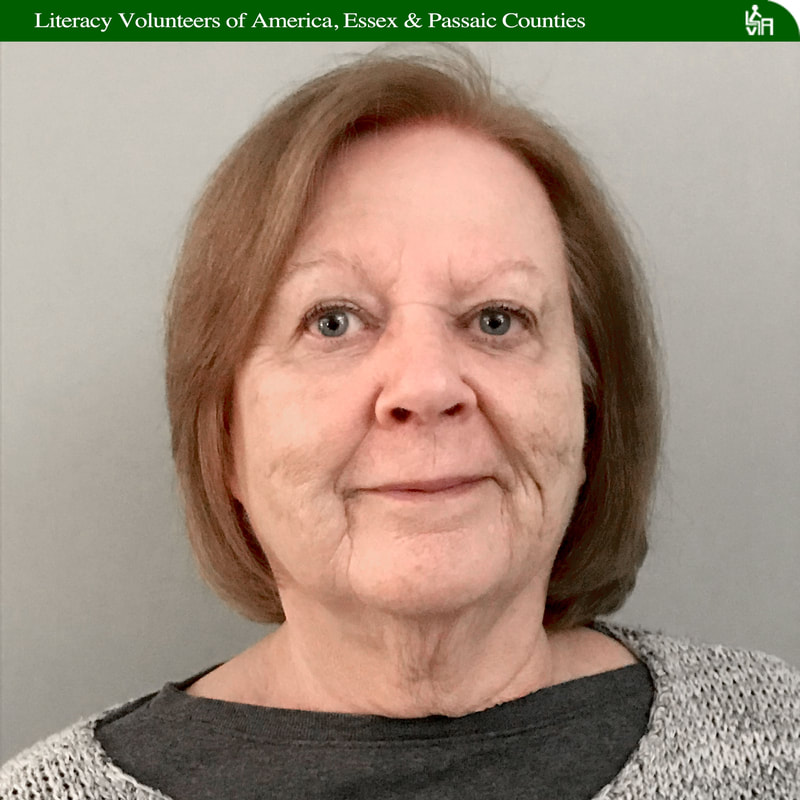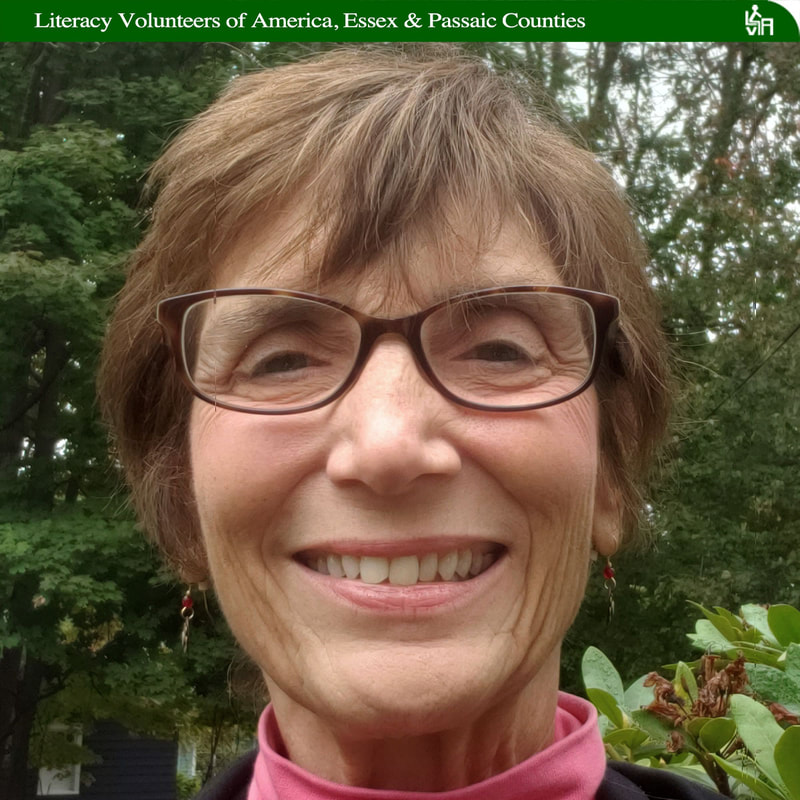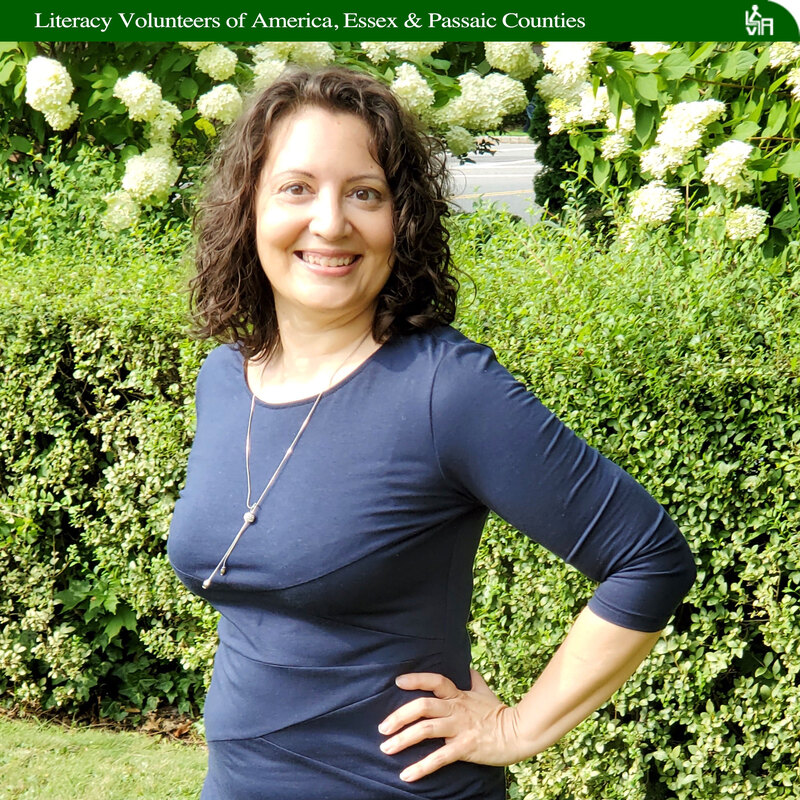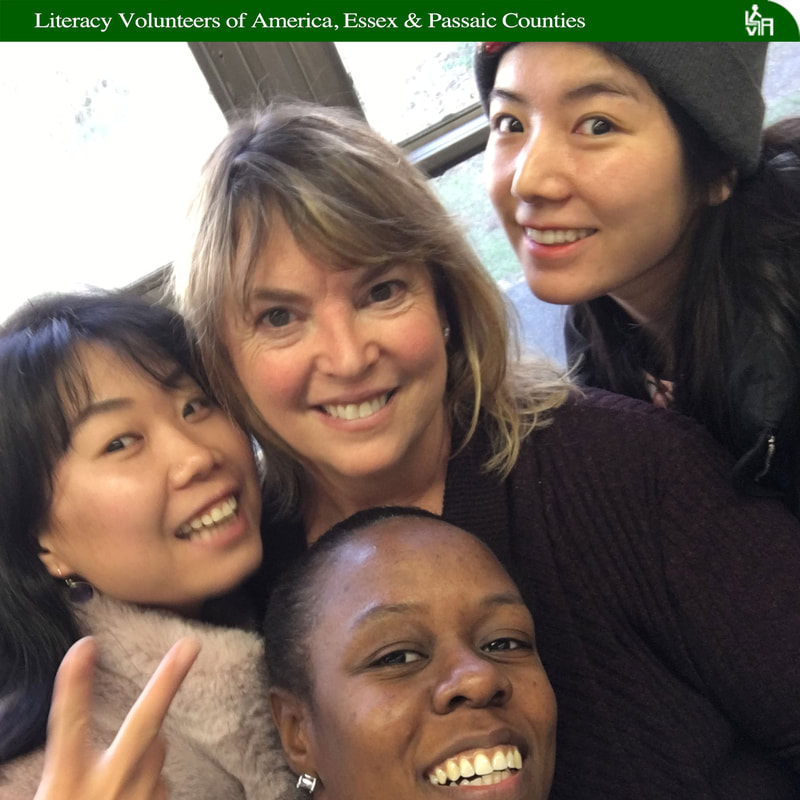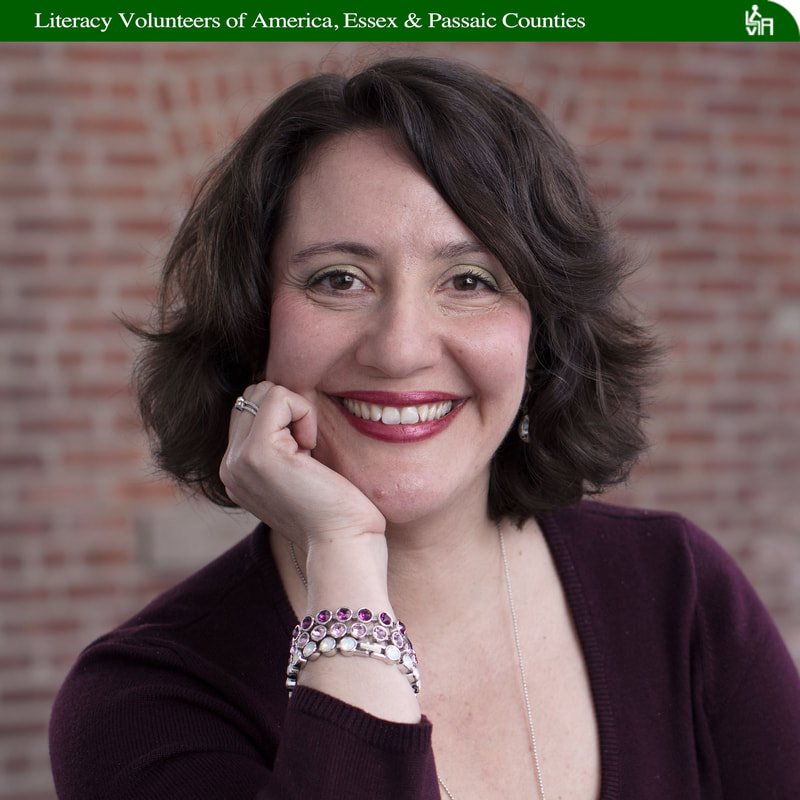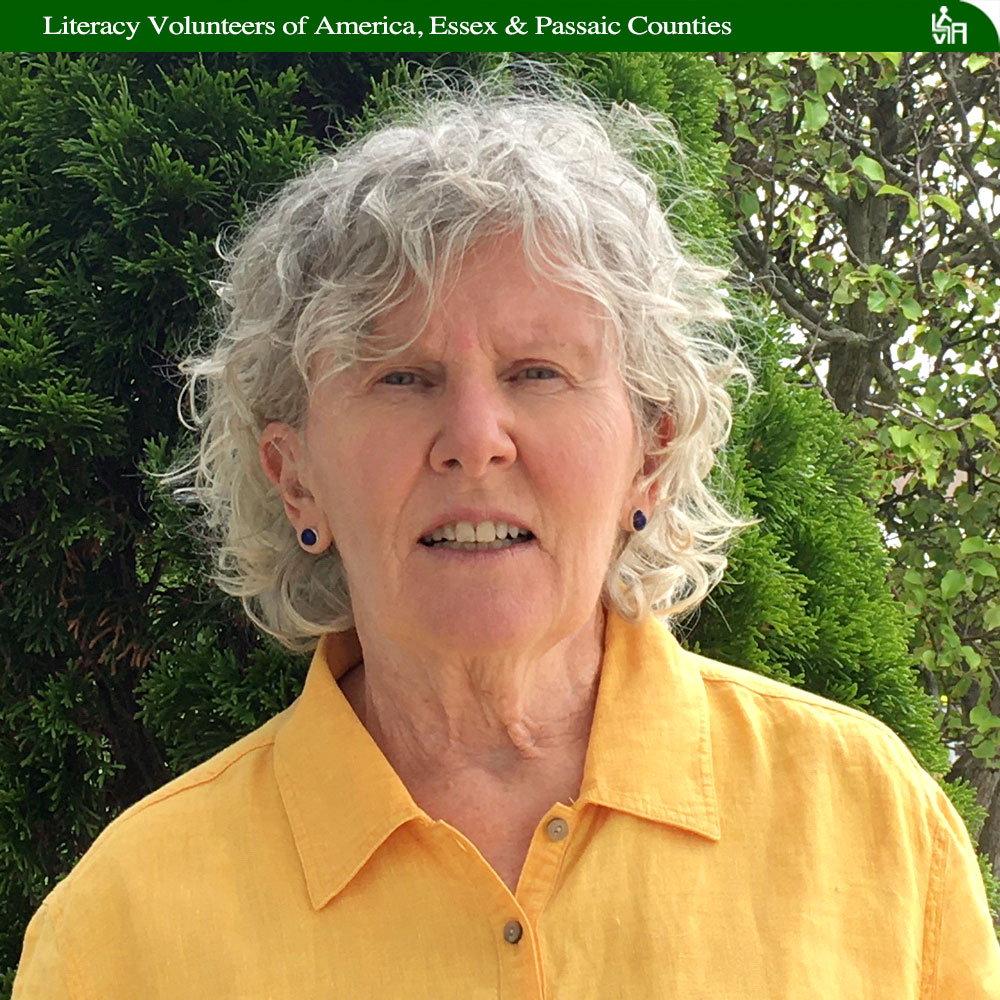Volunteers' Stories 2019-20
Everyone has a story, unusual, exciting, different. Many of them are just waiting to be read by others. From the front lines in Bosnia to the front office in Manhattan, Literacy Volunteers of America tutors come to us with fascinating backgrounds. We are proud to share the highlights of these amazing individuals who bring their varied experiences to our students.
Enjoy reading about people like the former missionary who provided medical supplies to remote villages, retired business people, lawyers, healthcare providers, college students, building for the future, who generously share their wealth of newly acquired knowledge, and even mothers whose role as primary as caregiver for their children willingly juggle home life, work as well as tutoring.
Enjoy reading about people like the former missionary who provided medical supplies to remote villages, retired business people, lawyers, healthcare providers, college students, building for the future, who generously share their wealth of newly acquired knowledge, and even mothers whose role as primary as caregiver for their children willingly juggle home life, work as well as tutoring.
Mimi PapermanIt wasn’t easy catching up with tutor Mimi Paperman because, frankly, she doesn’t exactly sit at home waiting for your call.
When we finally did, the busy Queens, NY native had just returned last month from an exhaustive trip to Seward, a seaside village on the Gulf of Alaska where she and husband Joe visited their son, daughter-in-law, and two grandchildren. Traveling is an integral part of Mimi’s life and she’s done plenty of it. She’s driven across the continental U.S. to visit national parks and cruised along the Danube River through Germany, Austria, and Hungary. She’s vacationed in Belgium, England and France. And she regularly visits family in Alaska where she’s hiked stunning Kenai Peninsula trails, fed sea lions in a maritime center, landed by helicopter on a glacier, and mushed aboard a speedy eight-dog sled. “We like to travel,” said Mimi (pronounced “Mi-mee”.) “And because of the pandemic we haven’t been able to.” The pandemic and restrictions to prevent the spread of the coronavirus have affected nearly every aspect of our lives. For Mimi, it meant making serious adjustments to travel plans, gatherings with friends, and even tutoring. “It’s a challenge tutoring virtually,” said Mimi, who joined LVA about three years ago. “It was very difficult.” Mimi is a former kindergarten teacher and former geriatric social worker, who spent a long period in adult protective services where she looked out for abused and exploited adults. She’s volunteered at St. Barnabas Medical Center, making bedside visits to patients and is currently a “reading buddy” for The Retired and Senior Volunteer Program (RSVP) where she spends time reading to a elementary school students. She is also a volunteer for the National Council of Jewish Women where she advocates for gun control legislation. And she stays fit by taking virtual Tai Chi and exercise classes. “I try to do as much as my energy allows me to do,” explained Mimi. That of course includes tutoring which continues virtually but more smoothly through the use of FaceTime, a video call platform developed by Apple, Inc. “It’s a little easier now that we see each other,” said Mimi, who focuses mostly on reading and pronunciation during her weekly meetings with her student. “I love tutoring because I feel like you’re helping someone who wants help. It’s very rewarding.” |
Charlotte McAllister AttenboroughWith her customary humor, Charlotte McAllister Attenborough recalled her first meeting with students as a volunteer literacy tutor. It was something of a shocker when, fresh out of training, she slowly introduced herself to the Turkish couple assigned to her and they responded in fast and flawless English.
“Are you here for English as a second language?” she asked the husband. “He said ‘Yes, are you here to teach?’ ” After chatting for a few minutes Charlotte asked “Well … what do you want?” she said with a laugh. “There’s been some mistake, what do you want?” It was a conundrum, no doubt, but no mistake. While the husband was something of a scholar whose work had been published in English language scientific journals, he was also a registered literacy student. His wife was a nurse who, while not as fluent as her spouse, was still an advanced speaker. Charlotte summoned up the advice she’d received from trainer Nina Peyser which, in part, stressed the importance of expecting the unexpected, remaining flexible, and finding common ground within a diverse student group. A goal that the couple had in common was a desire to pass the state motor vehicle driver’s test and Charlotte helped them do just that. In the several years that have since passed, Charlotte has worked with immigrant students of different levels. Her current student, a woman from Guyana, was able to pass the U.S. citizenship test with Charlotte’s help. “It’s out of this world when they pass these tests,” Charlotte said of her students. In her spare time, Charlotte is an abstract painter, a potter, and an avid world traveler. She’s also a writer of poetry, short stories and, now, books. Her first children’s book, “Zakir! Get Outta the Street!” which teaches parents how to talk to their kids about traffic safety, has landed with a publishing company and is slated to come out later this year. Charlotte is a Newark native who spent nearly three decades as an administrator, as well as a teacher, at Essex County College. She became a volunteer in her retirement, or semi-retirement as she calls it, and tutoring quickly became her passion. “It’s the most worthwhile thing I am doing at the moment,” Charlotte said. “It’s the most challenging thing I’m doing at the moment. And I love it.” |
Dofi KuvoduDofi Kuvodu is a dreamer.
The former LVA student, now a tutor, envisions school libraries in her native Togo chock full of books, stacked on shelves that once lay are. She sees children in the small West African nation joyously receiving gifts of educational toys and clothing. And she imagines the lame as mobile, maneuvering through the streets in newly donated wheelchairs. And that’s no fantasy. It’s all part of “Dofi’s DREAM”, a non-profit that she registered in Togo with the help of her sister. Dofi collects books wherever she can, including many that have been discarded here in New Jersey, and ships them by the barrel to her hometown of Lomé, the nation’s capital and southernmost city. “When I came here, I saw books, sometimes free, sometimes in the garbage,” Dofi explained. “It’s like they don’t need them so I thought let me do something. I will collect them and I will take those books and send them back.” Her sister, who runs the Togo side of the operation, distributes the literature to schools. Books written in languages other than French or Ewé, are difficult to find in southern Togolese schools. “There are schools there that have libraries with nothing on the shelves,” Dofi said. She also collects and ships clothing and educational toys for children and wheelchairs for the disabled. Dofi aims to promote reading everywhere, not just Togo, and dreams of building her own library. She developed an appreciation for education as a child, at the hands of aunt, affectionately called “Mamy T”, who raised her and her siblings. “Every morning before we went to school, we had to read for her,” Dofi said. “And we had to do dictation in the morning. And you tried not to make a mistake. She took us to libraries; she gave us those treasures. It’s where I found that she did something great for us.” As for her road to volunteer tutoring, Dofi’s journey was different than most. Soon after moving to the U.S. in 2011 to join her husband, Komla, she enrolled in a conversation group at the East Orange Public Library. As her level advanced beyond that of the group, she stayed on to help other library literacy students. In the meantime, she earned an associate’s degree in music education from Essex County College and a bachelor’s in music from New Jersey City University. She currently works as a teacher assistant while she pursues a master’s degree in educational technology. Last year, Dofi attended LVA’s online tutor training workshop and was later assigned several students, making her that rare literacy student who goes on to tutor. She stresses the importance of everyday conversation in her lessons, and encourages students to aid their studies by watching movies and children’s cartoons in English. “First I want to help. I know how it feels not to be part of the community, to come from somewhere and you are not familiar,” she explained. “And seeing somebody accepting your help makes me feel good and, at the same time, you are learning about them, their culture, their other life and getting a chance to experience other people’s experience.” |
Margaret FogelMargaret Fogel felt many of the same sentiments and hopes as her classmates, minus the beginner’s chills and jitters, as they wrapped up a literacy tutor training program and prepared to meet their first students.
Maybe that’s because Margaret, who was born in South Africa and raised there and in Israel, where she became fluent in Hebrew but her parents never fully learned, was a bit more familiar with the language and other obstacles immigrant families face in a new country. Or perhaps it’s because she’d already spent years as a literacy tutor in New York City, working with well-established programs like Literacy Partners, Inc., and the New York Public Library. No matter the reason, it’s easy to see how her experiences could come in handy while aiding students such as a current one, an African woman in her mid-thirties with four children. The woman, a native of Nigeria, where English is widely spoken, could communicates orally but labored to read and write. “When I started teaching her, she barely could write two sentences,” Margaret explained. “She had a mental block about writing.” So Margaret drilled her on the craft, fully knowing that only frequent practice would help advance the student’s writing skills. They altered their approach somewhat when the pandemic hit. Her student began taking photos of things that she wrote. She sends the photos to Margaret, who puts them up on the Zoom screen they share. They read and write on just about everything, from news articles to non-fiction. “She writes now quite fluently,” Margaret said. “Her reading and writing have improved a lot. I have been trying to find things that are interesting to her. I have asked her to write about her kids, write about coming to the U.S.” Margaret’s own coming to America took place after a 1989 visit. She eventually married and remained in the states, working for an insurance company as a computer programmer, a field she’d studied at university in Israeli. She worked in the city, tutored students there at night, then traveled home to New Jersey. Her schedule opened up after she was laid off at work but the commute was no easier. “I realized it was too much effort to schlep into the city,” Margaret told us. “I had to come in twice a week.” Volunteerism is clearly part of Margaret’s life. In addition to her tutoring efforts, she’s spent years as a volunteer for organizations like Bottomless Closet, a nonprofit that supports disadvantaged women in New York City as they enter the workforce, as a docent for the Central Park Zoo, and for Maplewood Memorial Library. So, when she stopped tutoring in the city, she began searching online for a local opportunity. She found one on Idealist, a web-based search program for job, internship and volunteer opportunities. “I looked at Idealist and saw LVA’s ad for a training in Maplewood,” she said. “I thought this was meant to be.” |
Nat CheneyWhen adult education went virtual in the early days of the pandemic, so did tutor Nat Cheney. Or at least he tried.
But every time he logged on to Zoom, the popular cloud-based platform for video and audio conferencing, his old computer struggled, puttered, and died. So he turned to another platform, this time an advanced online teaching tool that his wife used for music rehearsals. Again, his computer crashed. “They said my computer was obsolete and could not handle the bandwidth needed,” Nat said of the computer techs he’d consulted. “That was helpful but not good news. But it led me to buy a new computer and since then I haven’t had any problems.” That may seem a hefty financial investment for an unpaid tutor. But for Nat, who recalled how he’d labored to learn Portuguese when he arrived in Brazil on a four-year work assignment, it’s hard to put a price tag on literacy. He knew there were students who counted on his lessons continuing, as they struggled to better communicate with their children’s teachers, find employment, and understand public health advisories in the age of a novel coronavirus. He also was aware of the volatility of their lives. “The students have been very diligent and loyal,” Nat said. “The turnover is unavoidable and people have to do what they have to do. Life intervenes. The first student that left had a medical issue, and another just got rehired when her job became available during COVID.” Nat’s immigrant years were easier, given that finding a job that paid a living wage was not an issue, but nevertheless were unnerving. “I had no idea about the language obstacles I was to encounter,” he explained. “It took about three months for the lights to come on.” He met with a tutor three nights a week and was placed in a part of the company where no one else spoke English. “It is really the most effective way to learn,” he said of the total immersion that eventually led to his fluency. “That experience sensitized me toward linguistic challenges we face when we move to another culture.” Nat retired from his job in finance two years ago. In his spare time, he enjoys playing tennis, traveling, and singing. He’s sung in his church choir for 40 years and, about five years ago, joined the Oratorio Society of New Jersey, an amateur ensemble that performs major Western classical and choral works. |
JoAnn KatzbanThings went smoothly, at least at first, for JoAnn Katzban, a career attorney who, in her retirement, dove into the world of adult literacy.
She’d trained as a volunteer tutor, shaken off initial jitters of teaching English to absolute beginners, and fine-tuned her lesson plans to incorporate discussions of news items, local holidays, as well as the students’ traditions and cultures back home. Then, suddenly, everything changed. “When we hit the pandemic, I thought, ‘What do we do now’?” said JoAnn, who joined LVA about a year ago. Her students were beginning to ask the same. So she opted to move her lessons to Facebook video calls, a portal that she was familiar with. But there were other obstacles, for sure, like adjustments in meeting days and times as students’ work schedules changed, and even illnesses when students were afflicted by the coronavirus. “It was a learning experience for me but now it is as easy as can be,” explained JoAnn. The day before meetings, she emails materials to her students who have expressed interests in learning everything from common, everyday phrases to how to order prescription medications. “They want to learn,” she said, adding that her two students became fast friends during their sessions. “One student will be taking her citizenship test next year, another is very invested in using her English all the time. It is truly inspiring.” But meeting the expectations of students during a worldwide health crisis was anything but easy. Almost overnight, teachers and tutors scrambled to move in-person sessions to online or telephone platforms that allowed students to continue to learn while keeping them physically safe. Libraries closed down; even coffee shops were shuttered. Personal plans, like JoAnn’s long-anticipated visit to Istanbul, Turkey, were placed on hold of course. But she adapted. “It was a definite learning process,” JoAnn said of the early days of the crisis. “You just try things and figure things out.” JoAnn is quick to point out that she is not a teacher, rather a professional with an appreciation of the English language. The Milwaukee native earned a bachelor’s degree in sociology, a masters in urban planning, and a law degree from Seton Hall University Law School. She also has decades of experience as a practicing attorney. As a lawyer she had to write English flawlessly. As a tutor, she finds herself calling on her journalist son from time to time to consult on some finer grammatical points as she prepares her lessons. JoAnn was alerted to the volunteer post through a flier she spotted at the Montclair Public Library. “I enjoyed the training,” she said of her classes. “It was a lot of fun and it was a very nice group of people.” At the same time, she added, “It was a little bit scary because the materials were based on people who speak little to no English at all. Very basic. I Thought, how am I going to do this?” She also reasoned that she wasn’t alone in her thoughts. “I figured lots of other people had the same response as I,” she said. “I figured if they can do it, I can do it. I have no background in teaching. It took me a while to really develop the outline for a lesson plan that really worked for my students that I am really comfortable with. I learned by working with the students and seeing what they needed and responded.” In her spare time, JoAnn is a voracious reader, with a penchant for biographical and socio-political non-fiction. And she’s an avid gardener. Her backyard boasts of lively liatris plants, balloon flowers, stargazer lilies – pretty much anything with a pink or purple hue that blooms in summer. “And, of course, roses,” she said. “Who doesn’t love roses? All things you can do during the pandemic. A lot of heaving pruning got done this year.” |
Trina RogersFace masks and shields, six feet of separation, handshakes, hugs, and other forms of physical contact discouraged. Is it any wonder that the pandemic, with its months-long run, has left many of us feeling disconnected and socially isolated?
Well, for Trina Rogers and Zeno, her student from Thailand, discussions of the coronavirus, masks and social distancing brought them closer, helping the duo turn lemons into, well, a fruitful learning partnership. “It was dumb luck the way that happened, for me to find something he was excited about,” said Trina who, like most tutors, relishes the moment that she really connected with her student. “We were talking about COVID,” she explained. “He went and got his mask. So I went and got my mask. I made it into a lesson plan.” And, as luck would have it, turns out Zeno is something of a talented mask-maker. “In the process of talking about masks, I learned that his sister taught him how to sew,” she said. “We talked about where he bought his material, how hard it is to find elastic, different patterns. I introduced new vocabulary. We had an animated 40-minute conversation about masks,” she said with a wave of enthusiasm. Trina, whose father was an immigrant from Venezuela, was raised in the Washington Heights section of Manhattan. In that part of the city, home to thousands of Latin American immigrants, she said she encountered many people who struggled with English, people whom she wanted to help. “I heard a lot of Spanish growing up,” said Trina.” I didn’t focus on learning Spanish. I have an appreciation of how difficult it is to learn another language since I failed miserably at learning Spanish.” Trina earned a bachelor’s degree in psychology from Fordham University and a master’s in child development psychology from Fairleigh Dickinson University yet did not work in the psychology field. She worked in the finance division of a large engineering firm and later purchased and ran a franchise of Decorating Den, a half-century old interior decorating company. She eventually left the franchise, spending much of her time in the PTA and Home and School Association of her children’s school. One of her sons went on to major in international relations, embraced Latin American culture and traveled all over South America. She completed the tutor training a year ago and admitted to leaving with a tad of uneasiness about getting started. “I did have apprehension but not enough to keep me from doing it. They are trusting you to help them get there,” she said of our students. “I knew I had to take the leap.” Her first student was an imam, an Islamic religious leader with whom she enjoyed a polite, respectful relationship, despite their language and cultural differences. Her current student is Zeno, the mask maker from Thailand. He works in a hair salon. “I have been extremely fortunate,” Trina said. Zeno “was warm and completely motivated. It took me a while to assess where he was, especially on Zoom. You miss those subtle cues. I have been fortunate with all of the students assigned to me,” she added. “I have really cared about them all. |
Lisa BatittoAttend a single Lisa Batitto literacy session and you’re likely to leave singing her praises. At the very least, you’ll be singing.
That’s because Lisa, who joined LVA as a volunteer tutor five months ago, is a huge advocate of using pop music song lyrics to teach English to adults. “I like to take the class and tie popular song into it,” explained Lisa, who uses the verses to teach grammar, vocabulary, idioms, and culture to Serhad, a student from Turkey, and Erika from Ecuador. “We go through the song lyrics and both students started singing a beautiful duet,” she said of one tune. “They balance each other out really well.” While singing your way through class may seem peculiar to some, the use of song lyrics has long been lauded by academics who find that it helps maintain student interest, and is useful in teaching grammar, vocabulary, and culture. Songs can be used as writing prompts and are even said to enhance memory, they say. Lisa’s students sing while learning idioms like “Holding my breath” from the Katy Perry song, “Roar”, and the provocative double-negative “We don’t need no education” from Pink Floyd’s “Another Brick in the Wall.” Serhad and Erika even enjoy imitating song stylists as unique as Bob Dylan, Elvis Presley, and Janis Joplin. “It’s because they’re having a good time and they’re laughing that they tend to remember,” Lisa told a group of volunteers who attended a recent tutor support workshop she presented, “Laughter is the Best Teacher”. She recalled her own school days when, while sitting in a classroom through what she called a “really dry lesson”, she struggled to stay focused. “But then other times you think of a lesson where the teacher had you so engaged that you couldn’t wait to go to class again,” Lisa said. “And that’s the kind of energy I try to bring into my lessons with my students.” She uses the website “Tune Into English” (www.tuneintoenglish.com), for its selection of songs and exercises for students, as well as YouTube, although she cautioned tutors to beware of culturally-insensitive material on that site. Lisa came to LVA with a bachelor’s degree in communications, TESL and TEFL certificates, and a history of teaching practical English to students outside of the traditional classroom with an organization known as Language a GoGo. She has worked as a public relations manager for both the Montclair Art Museum and the Newark Museum. While a museum worker, she learned of LVA. “I have really been lucky,” she said of her experience as a tutor. “I have two enthusiastic students. Both of my students like to take risks. Classes are challenging. They are both willing to be silly.” Her sessions have focused on everything from taking selfie photos to cooking, and from discussions of the art of Vincent van Gogh to the music of U2, Van Morrison and The Rolling Stones which, so far, has kept students engaged. “I like Lisa a lot,” said Serhad, the student from Turkey. “She makes learning very pleasant.” |
Amy MahoneyThe pandemic struck suddenly, taking Amy Mahoney by surprise, as it did every other educator who’d earned her stripes in front of large classrooms and small groups.
But for Amy, who’s been to Poland and back to earn a TESL certificate and gain valuable teaching experience, it was just one more hurdle to clear. “I am not a high-tech person so I have had to adapt and develop new techniques,” the volunteer tutor. “Distance learning has been more challenging.” Since the early days of the crisis, distance learning has brought new obstacles, among them ensuring universal access to a computer, a tablet, or a phone, and a strong WIFI signal for all, as well as compensating for the loss of personal interaction and the ability to communicate through body language in class. But Amy is coping. “My students have been up to the challenge and I have as well,” said Amy. “You have to learn to roll with the punches in this uncertain world right now.” This literacy volunteer has worked as a therapist and mental health counselor for more than 25 years, including a post as a bilingual therapist in Florida. And she’s long held a special place in her heart for immigrants, as well as a passion for working with English Language Learners. Amy taught ESL at The Elizabeth Coalition to House the Homeless. While there, she learned of LVA through an online service that matches volunteers with suitable work in non-profits. She said she was particularly impressed with LVA’s training for tutors. From that point on, it was a go. “That appealed to me,” Amy said. “That was a great beginning. I loved the training, the peer interaction, and the trainer, Mary O’Connor.” After training, she was assigned to a basic literacy student with whom she worked for one year. But her experiences at LVA and the Elizabeth coalition spawned an interest in delving further into teaching, she said. So Amy went on to earn a certificate in Teaching English as a Second Language (TESL) at The New School, a unique university in New York City. The certificate program has a reputation for its vigor. “It was very challenging but rewarding,” Amy said of the experience. “I did my practicum in Poland.” That program was coordinated through a university in Poland, with intermediate level students, ages 14-65. Later, she returned to volunteer at LVA and, for the first time, worked with students from China and Haiti. “Teaching pronunciation was a challenge,” Amy acknowledged. “Both students brought different stories. One of my favorite parts of teaching is developing the relationships with the students and the stories that they bring with them.” She varies her sessions, moving purposely between grammar structure and life experience. “One class may be grammar focused, another class could be about text messaging,” she explained. Amy’s background is in psychology, a field in which she earned a bachelor’s degree, with a minor in Spanish, from The State University of New York at Cortland. She received a master’s degree in clinical psychology from The New School. In her personal life, she’s been married 31 years and has two sons, ages 24 and 30. She has a deep interest in meditation and the spiritual realm within oneself. She’s a Kansas native who moved to New York in the 8th grade which, of course, drew the interest of fellow students who knew Kansas for one thing. “It helped me to become very flexible and adaptable,” she said of the move. “I got made fun of (with) … ‘Is your name Dorothy? How did you get here? Did you click your heels?’” |
Christina RahhalChristina Rahhal is a free spirit who likes sharing what she has learned to help others find their way too. Christina was born in New York City, raised in Brooklyn, and now resides in Montclair. She has a passion of sharing herself and making a difference in other people’s lives. That might mean teaching English, distance learning techniques, and following your intuition.
While Christina was a student studying environmental science and photography at the State University of New York, Purchase, Christina became involved in a women’s alternative health clinic. This clinic served students at SUNY and was a way for them to get information about topics they might have been uncomfortable asking about at traditional health services. After college, Christina worked at the NYC Mayor’s Office under Rudy Guiliani, as Seminar Coordinator for Living in the Moment Seminars with Ariel and Shya Kane, and now for the past 20 years she is Vice President of Operations for TAG Online, Inc., a website design, development and hosting company located in Clifton, NJ. “People here are very generous,” Christina said of TAG Online. “If they see you have a passion for something, they want to help you nurture that passion.” Christina is also a Certified Health Coach. “Food is incorporated into everyday life,” Christina said. “A lot of people aren’t educated as to what foods to eat to lead a long and healthy life.” Christina also found LVA as an opportunity to utilize her skills. “I found out about LVA from the Montclair group on Facebook and said I want to do this,” Christina remembered. It turns out her mom was also tutoring children in ESL in New Mexico. Carrying over from the seminars she ran on self-discovery, Christina brings a lightness to the lessons, knowing they do not have to be too serious. The tutoring sessions bring happiness to the student and tutor each week. And, of course, learning. Sometimes the student takes on the role of the tutor and Christina learns a lot about her student and her culture. Food is always a good ice breaker and in Christina’s case, an opportunity to educate beyond teaching literacy. Christina’s first LVA student is Hilal, a woman from Turkey. “It’s been great, I find her passion for learning English inspiring.” Hilal really wants to be able to communicate in English,” Christina said. |
Terry Waters
|

